译林版(2019) 选择性必修第一册 Unit 2 The Universal Language Workbook 课件(68张)
文档属性
| 名称 | 译林版(2019) 选择性必修第一册 Unit 2 The Universal Language Workbook 课件(68张) |
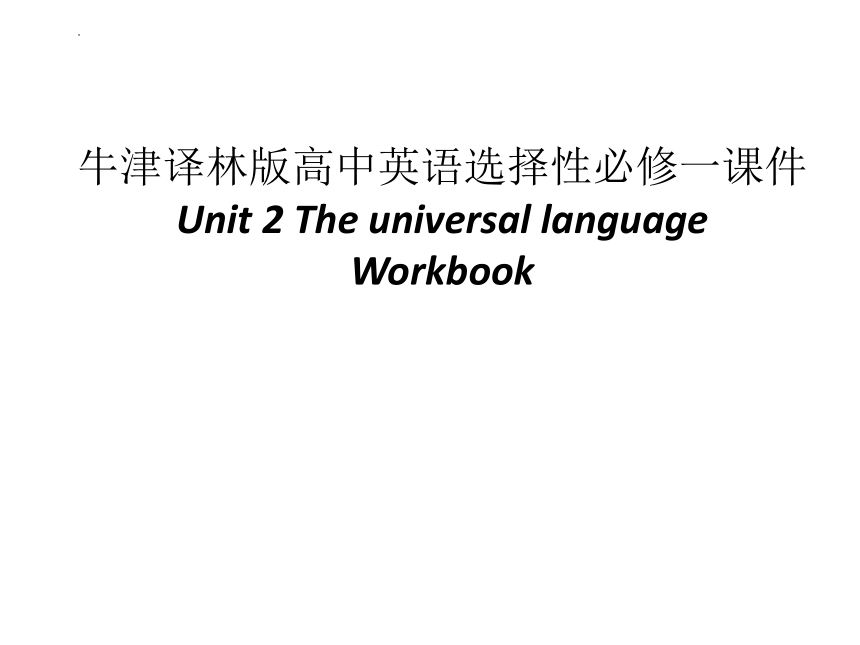
|
|
| 格式 | zip | ||
| 文件大小 | 156.5KB | ||
| 资源类型 | 教案 | ||
| 版本资源 | 牛津译林版(2019) | ||
| 科目 | 英语 | ||
| 更新时间 | 2022-08-03 00:00:00 | ||
图片预览


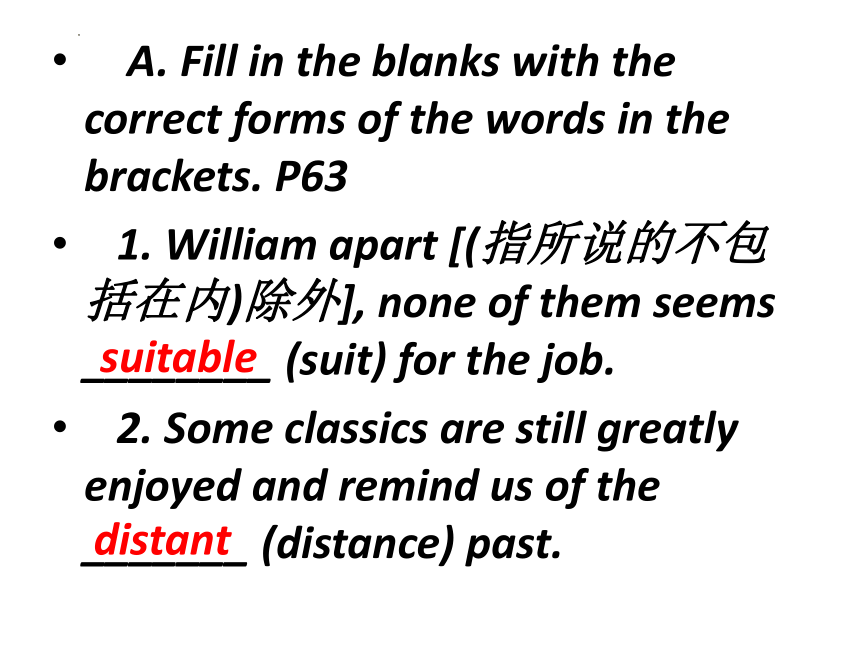
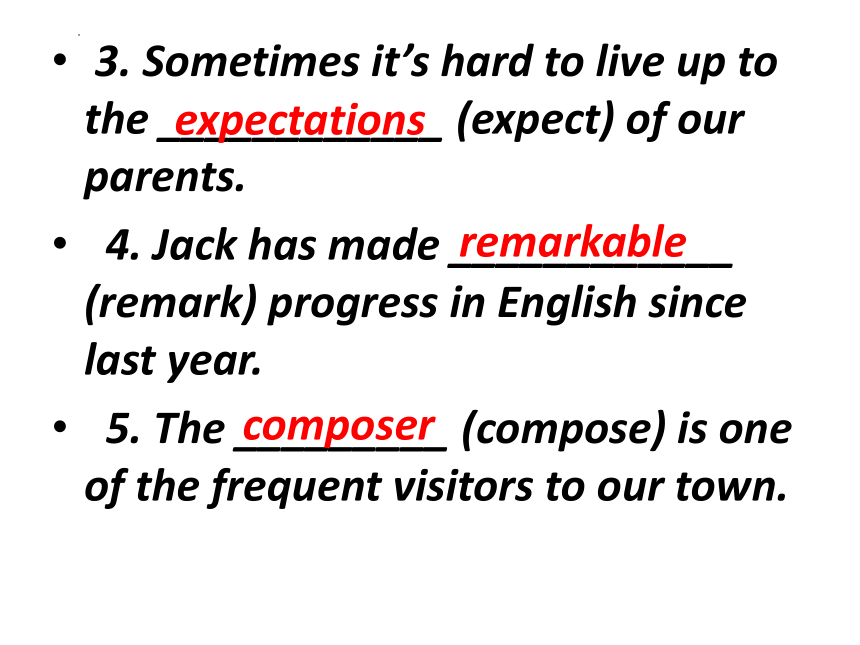
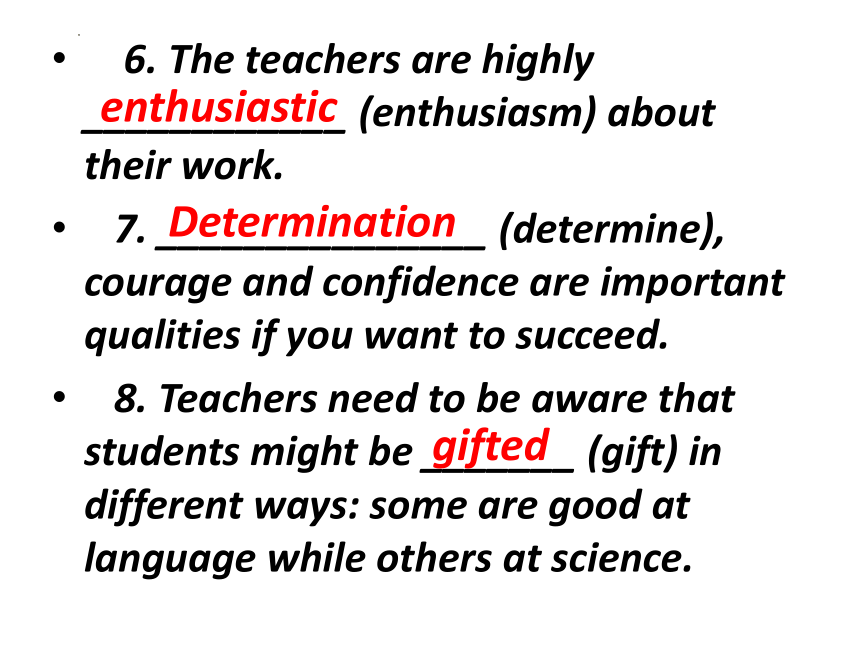
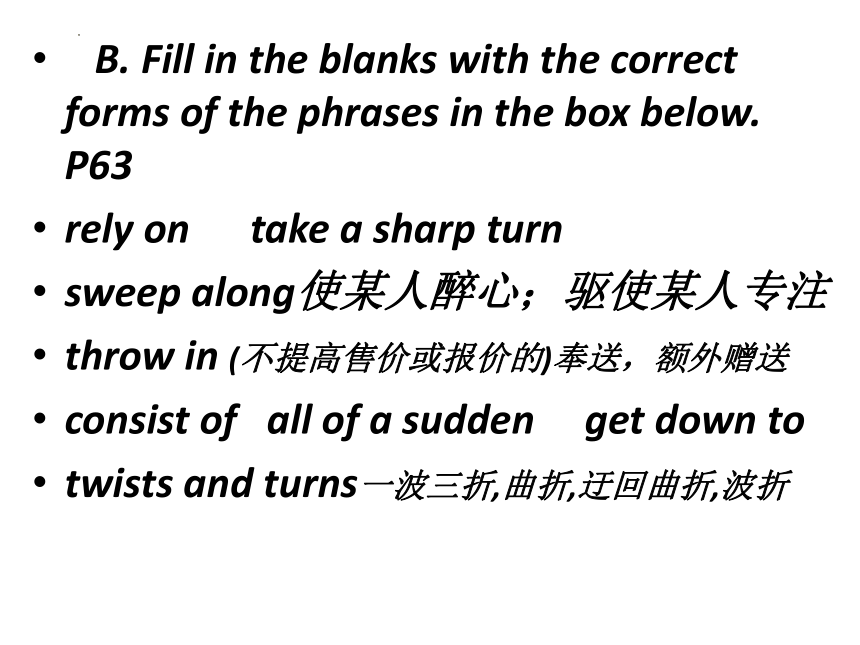
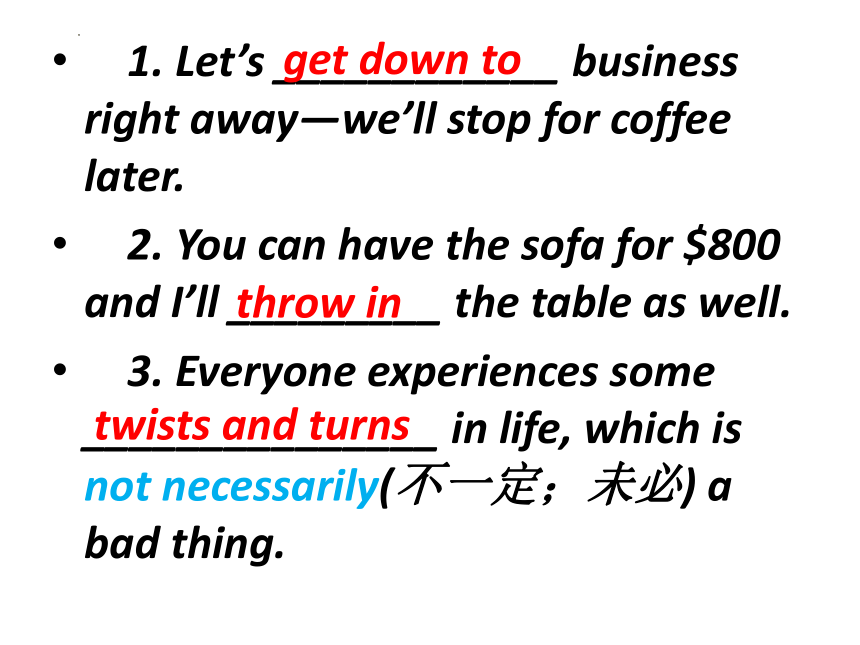
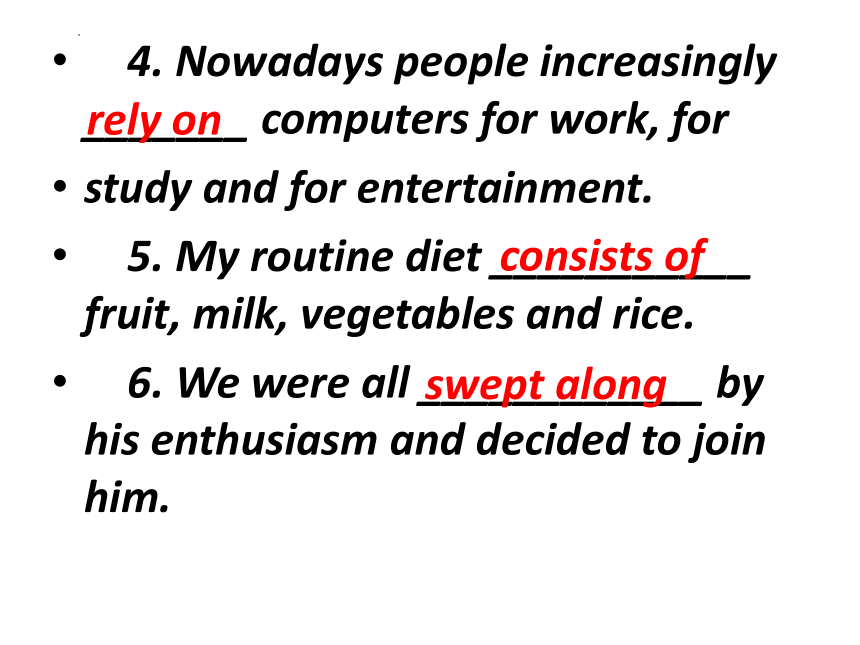
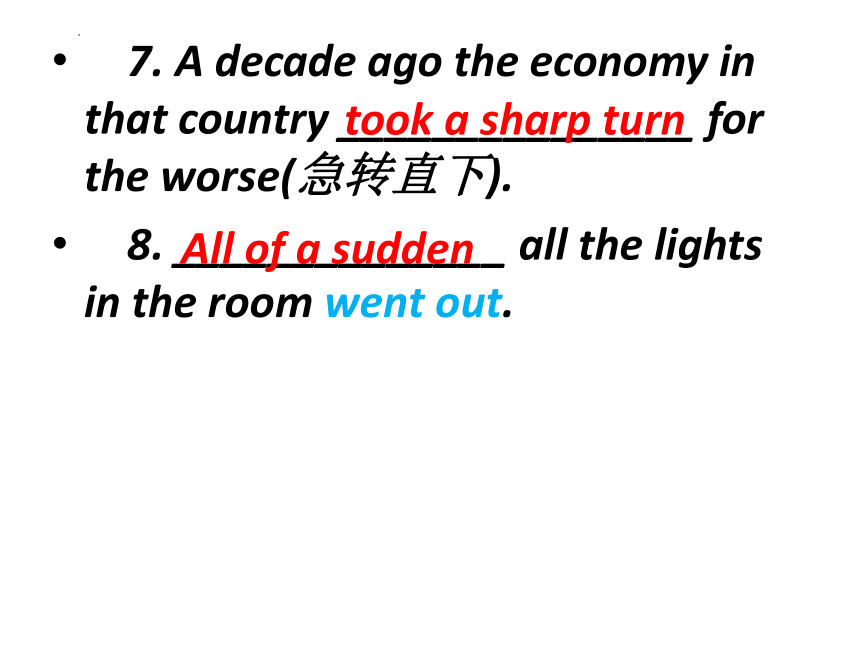
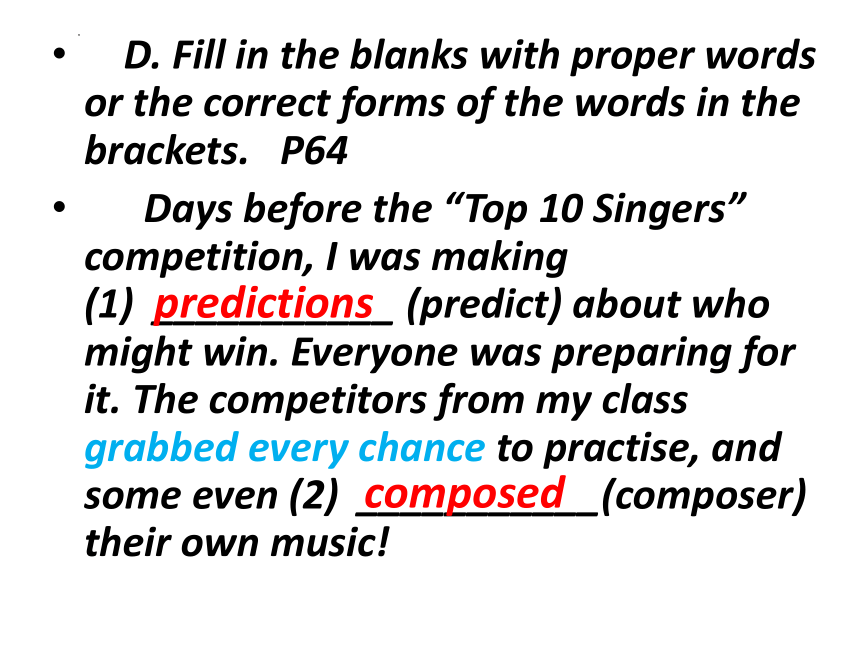
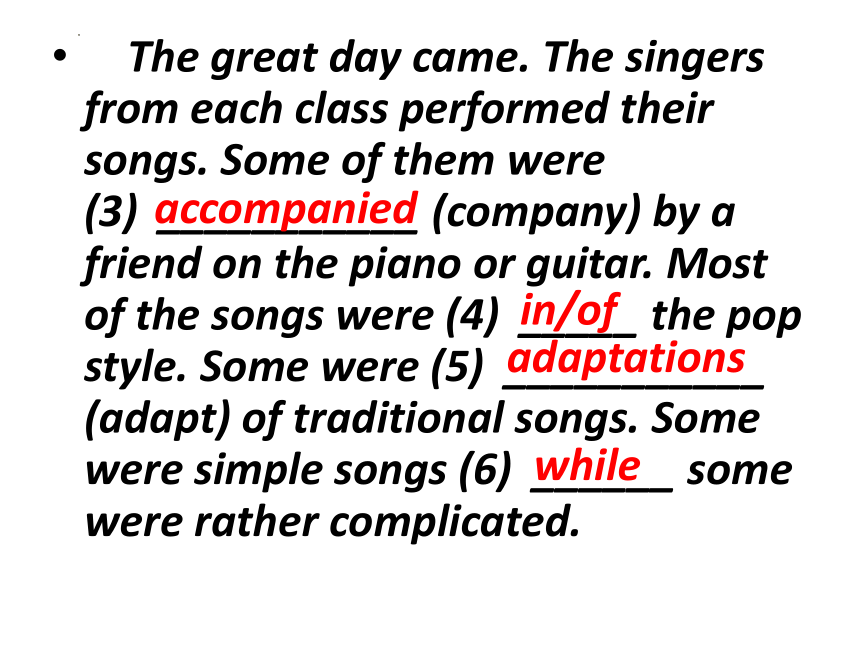
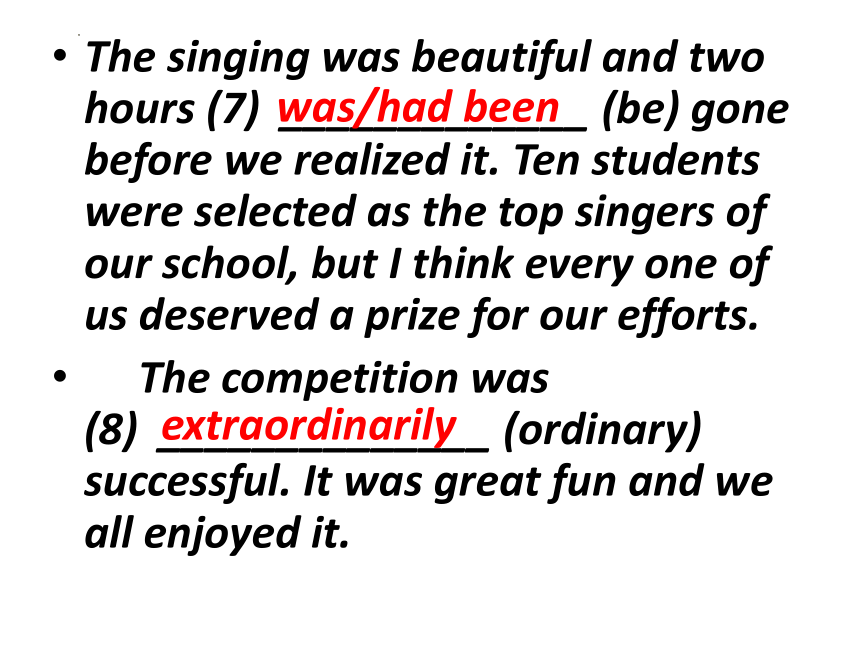
文档简介
(共68张PPT)
牛津译林版高中英语选择性必修一课件
Unit 2 The universal language
Workbook
Exploring language
A. Fill in the blanks with the correct forms of the words in the brackets. P63
1. William apart [(指所说的不包括在内)除外], none of them seems ________ (suit) for the job.
2. Some classics are still greatly enjoyed and remind us of the _______ (distance) past.
suitable
distant
3. Sometimes it’s hard to live up to the ____________ (expect) of our parents.
4. Jack has made ____________ (remark) progress in English since last year.
5. The _________ (compose) is one of the frequent visitors to our town.
expectations
remarkable
composer
6. The teachers are highly ____________ (enthusiasm) about their work.
7. _______________ (determine), courage and confidence are important qualities if you want to succeed.
8. Teachers need to be aware that students might be _______ (gift) in different ways: some are good at language while others at science.
enthusiastic
Determination
gifted
B. Fill in the blanks with the correct forms of the phrases in the box below. P63
rely on take a sharp turn
sweep along使某人醉心;驱使某人专注
throw in (不提高售价或报价的)奉送,额外赠送
consist of all of a sudden get down to
twists and turns一波三折,曲折,迂回曲折,波折
1. Let’s ____________ business right away—we’ll stop for coffee later.
2. You can have the sofa for $800 and I’ll _________ the table as well.
3. Everyone experiences some _______________ in life, which is not necessarily(不一定;未必) a bad thing.
get down to
throw in
twists and turns
4. Nowadays people increasingly _______ computers for work, for
study and for entertainment.
5. My routine diet ___________ fruit, milk, vegetables and rice.
6. We were all ____________ by his enthusiasm and decided to join him.
rely on
consists of
swept along
7. A decade ago the economy in that country _______________ for the worse(急转直下).
8. ______________ all the lights in the room went out.
took a sharp turn
All of a sudden
D. Fill in the blanks with proper words or the correct forms of the words in the brackets. P64
Days before the “Top 10 Singers” competition, I was making (1) ___________ (predict) about who might win. Everyone was preparing for it. The competitors from my class grabbed every chance to practise, and some even (2) ___________(composer) their own music!
predictions
composed
The great day came. The singers from each class performed their songs. Some of them were (3) ___________ (company) by a friend on the piano or guitar. Most of the songs were (4) _____ the pop style. Some were (5) ___________ (adapt) of traditional songs. Some were simple songs (6) ______ some were rather complicated.
accompanied
in/of
adaptations
while
The singing was beautiful and two hours (7) _____________ (be) gone before we realized it. Ten students were selected as the top singers of our school, but I think every one of us deserved a prize for our efforts.
The competition was (8) ______________ (ordinary) successful. It was great fun and we all enjoyed it.
was/had been
extraordinarily
More importantly, such activities reflected our dreams and our passion and transformed our understanding of life.
Building skills
A. Listening and speaking
A1. Tom is listening to the radio programme Opera Hour introducing Aida ['e d ]. Listen to the programme and number the events in the order they happen in Aida.
____ Radames asks the Egyptian king not to kill the Ethiopians [ i:θ ' p n].
____ Radames helps Aida and her father escape.
____ The Ethiopian king and his army go to Egypt.
5
8
2
____ Aida is taken to Egypt.
____ The Egyptian army wins the battle.
____ The Egyptians start preparing for the wedding.
____ The Egyptian king orders Radames to stop the Ethiopian army.
____ Radames is ordered to marry the Egyptian king’s daughter.
1
4
7
3
6
Tapescripts
Radio host: Welcome opera lovers! I’m your host Martha Spencer. Today we’re going to talk about Aida, a timeless(永恒的)story of love in the time of war. At the beginning of the opera, Aida, an Ethiopian princess, has been taken to Egypt as a slave.
Her father, who is the king of Ethiopia [ i:θ ' p ], is now leading his army to save her from the Egyptians. As the Egyptian king hears this, he orders a young military commander named Radames to stop the Ethiopian army. But there is a problem: Radames is in love with Aida!
Radames successfully leads his army and defeats the Ethiopians. However, since he loves Aida, he asks the Egyptian king not to kill Aida’s father and his soldiers. The king agrees, but he then asks Radames to marry his daughter. As the Egyptians prepare for the wedding, Radames helps Aida and her father escape.
If you want to know what happens next, watch the whole opera yourself.
Well, luckily for you, listeners, Aida is now being staged(上演) in our local theatre. And this time, thanks to amazing 3-D technology, the production team has managed to breathe new life into [(给某事物)带来起色,注入活力] this timeless classic with a big screen on the stage.
People who have watched the performance say they are very impressed by the wonderful visual experience and the excellent acting. I highly recommend the opera and I’m sure that you’ll love it!
A2. Tom has seen the opera Aida and is talking to his mum about it. Listen to their conversation and complete the notes below. P65
Aida
Theatre
The theatre was (1) ____.
Performance
The singers’ voices were (2) _______________ and emotional. The lady who played Aida sang for (3) _____________________ hours.
The performers acted so well and (4) ___________________________(使更有趣;使更生动).
full
(very) powerful
nearly two and a half
brought the characters to life
Music
The musicians were fantastic. I was swept away(使某人醉心;驱使某人专注) by the music.
Set(布景)
The stage was pretty special. The 3-D technology made (5) ________________.
I was actually a little (6) __________ during the battle scenes.
everything look real
frightened
Story
The most impressive part was that Radames had to make a difficult choice between (7) _____________________.
The ending was so moving that some people in the audience (8) _____.
his love and his country
cried
Tapescripts
Tom: Hi, Mum, I’m back!
Mum: How was the opera Did you like it
Tom: Yes. It was amazing! I enjoyed it very much. The theatre was full, but I had a great seat.
Mum: What did you think of the performance
Tom: Wonderful. The singers’ voices were very powerful [(声音)响亮的,洪亮的]and had so much emotion in them. The lady playing Aida was just incredible. I don’t know how she managed to sing like that for nearly two and a half hours without losing her voice. The performers acted so well. They brought the characters to life!
Mum: What about the music
Tom: It was so good. The musicians were really fantastic, and I was swept away by the music.
Mum: Did you like the set
Tom: Yes. The stage was pretty special. The 3-D technology made everything look so real that it felt like you were really in Egypt! And I was actually a little frightened during the battle scenes.
It was as if the war was happening right in front of me.
Mum: That sounds exciting, Tom. What did you think of the story
Tom: I loved it. What impressed me most was the difficult choice Radames had to make between his love and his country.
Mum: I heard the ending was especially moving.
Tom: Yes! In the final act[(戏剧等)一幕], Radames was sentenced to death for helping Aida escape, but he was happy because he thought she had reached her own country. However, while he was in prison, he heard a sigh and was surprised to see Aida. She had hidden herself in the prison in order to die with him.
The ending was so touching. I saw some people in the audience crying when Aida died in Radames’s arms.
Mum: This was indeed a great opera!
A3. Have you attended or watched any musical performance, such as a concert, a musical or
an opera In pairs, talk about your experiences. Use the example below to help you and pay attention to the expressions in bold. P66
A: What did you think of the New Year’s concert
B: Although I don’t usually listen to classical music, I really enjoyed it. I had never seen a symphony orchestra before! The members of the orchestra were highly skilled musicians. They looked very serious at first, but they were clearly having lots of fun when they played the fast pieces.
A: What pieces did they play
B: The theme of the concert was “French composers”. They began with a piece by Claude Debussy [kl :d d 'busi: ] called La Mer. It’s about the sea, and I felt as if I were out on the sea when listening.
A: Interesting. What else did they play
B: The second piece was called Boléro, and it was composed by Maurice Ravel [m :'ri:s r vl] . The beginning of the piece was very simple: all I could hear was a drum beating out a steady rhythm. After a short while, the drum was joined by a flute. I thought it was boring at first because they kept playing the same melody over and over.
However, the music gradually became louder and louder, and the ending was incredibly powerful!
A: Wow, that sounds amazing. What did you like best about the concert
B: The last piece they played! It was from the opera Carmen [ kɑ:men] by Georges Bizet [bi: ze ]. That was really exciting and everyone at the concert loved it!
B. Reading and writing
B1. Austria is famous for its long musical tradition. Read the magazine article about music in Austria and answer the questions below. P66
What comes to your mind[突然记起(或想到)] when you think of music in Austria You might think of classical composers, such as Mozart ['m tsɑ:t]. Or you might remember the film The Sound of Music, whose story takes place in Austria. But Austrian music started off(一开始是) quite differently.
One of the earliest types of Austrian music may not seem like music at all. Yodelling [ j udl ][用约德尔唱法歌唱(以瑞士传统的真假嗓音交替歌唱)] is a form of yelling that alternates [ lt (r)ne ts] (交替) in pitch[(尤指乐音的)音高]between low and high.It is thought to have begun as a way for animal herders in the mountains to communicate or to call their animals.
Even today, yodelling is often used in other kinds of music, including pop, rock and country music.
However, Austria is best known for its many famous classical composers. In the 18th and 19th centuries, the Austrian royal family were patrons [ peitr nz] [(艺术家的)赞助人,资助者] of the arts, and they drew many musicians to Vienna [vi en ].
The city soon became known as a centre for musical innovation and posers such as Wolfgang [ wulfɡ ] Amadeus [a'madi s] Mozart, Ludwig [ l dwiɡ] van Beethoven ['be t v n], Johann Strauss [stra s] II and Franz Schubert [' u:b :t] lived in Vienna. Some of them even used traditional Austrian folk songs or tunes in their works.
Opera has also been a popular music form in Austria, and it was not just wealthy Austrians who attended performances. Many popular classical composers also wrote operas, which regular citizens of Vienna flocked(群集;聚集;蜂拥) to hear. Even today, there are opera productions performed every year at the St Margarethen Opera Festival.
This festival is held outdoors, in a very unusual location: the rocky sandstone backdrop(背景)of a quarry(采石场). It now serves as a stage for opera, and also jazz and pop concerts. They all take place in the open air under the stars, taking advantage of the quarry’s unusual acoustics [ ku st ks] [(房间、戏院的)传声效果,音响效果].
Speaking of The Sound of Music, it was originally a Broadway musical and was made into a film in 1965. Most of the scenes were filmed in or near Salzburg [ s ltsb :ɡ], Austria. The story is based on the real-life story of the Von Trapp family, who fled from the country when the Nazis[ nɑ:tsi:z] invaded Austria.
Over 50 years after its release, the film is still very popular, and visitors to Salzburg can take special tours that include most of the film’s famous landmarks.
Austria has a long and rich musical history, from folk songs and dances to classical symphonies and operas.
No matter what kind of music you like, chances are that(可能…) you’ll be able to find it in one of the country’s many theatres or small cafés. The sounds of Austrian music are everywhere.
1. Why did Vienna become a centre for classical music
Vienna became a centre for classical music because of the Austrian royal family, who
were patrons of the arts. They drew many musicians to Vienna.
2. Why is the St Margarethen Opera Festival held outdoors
The opera festival is held outdoors against the rocky sandstone backdrop of a quarry,
which allows the performances to take advantage of the quarry’s unusual acoustics.
B2. Write an article introducing Kun Opera. Include information about its origin, features, famous pieces and influences on other music types. P67
Kun Opera: a short introduction
Kun Opera is an artistic [ɑ t st k] and elegant form of traditional Chinese drama. It is one of the oldest forms of opera still performed today and is our national treasure. It started in the late Yuan Dynasty and developed during the early Ming Dynasty, in the area around Kunshan, Suzhou.
What makes the style unique is its smoothly flowing melodies, and Kun Opera is considerably softer than Beijing Opera. The tempo [ temp ] [(乐曲的)速度,拍子,节奏] is slow, and brings to mind gentle waves on a lake.
这种风格的独特之处在于它流畅的旋律,昆曲比京剧要柔和得多。节奏很慢,让人联想到湖面上轻柔的波浪。
Another unique feature is that it is sung in a special stage dialect, based on the local dialect in Kunshan. The lyrics ['l r ks] (歌词) are similar to classical Chinese poetry.
The Peony [ pi ni] Pavilion [p v li n] (牡丹亭), first performed around 1599, is perhaps the most famous piece.
It was written by the playwright Tang Xianzu, and tells the story of the 16-year-old girl Du Liniang who falls in love with the scholar Liu Mengmei in a dream. Other famous pieces include The Peach Blossom Fan(桃花扇), The Palace of Long Life《长生殿》, The Western Mansion and The Legend of the White Snake.
Kun Opera dominated(支配;控制;左右;影响) Chinese theatre from the 16th to the 18th century and has influenced many other Chinese theatre forms, including Sichuan Opera and Beijing Opera. In 2001, UNESCO listed Kun Opera among the Masterpieces of the Oral and Intangible Heritage of Humanity.列为人类口头和非物质遗产的杰作之一
To summarize [ s m ra z], Kun Opera is a unique style of music with a long history. It is closely connected with Chinese literature and has played an important part in traditional Chinese culture.
Appreciating language
Ludwig van Beethoven got much comfort from his friends when he was in depression. Read aloud the letter below that Beethoven wrote to his friend Amenda.
My dear, my good Amenda, my warm-hearted friend,
I received and read your last letter with deep emotion, and with mingled [(感情)交织,交错] pain and pleasure. How often I wish that you were with me, for your Beethoven is very unhappy.
我满怀深情地收到并读了你的上一封信,痛苦和快乐交织在一起。
You must know that one of my most precious faculties ['f k( )lt z](官能;天赋), that of hearing, has become very defective(有缺点的;有缺陷的;有毛病的). Even while you were still with me I felt indications(迹象;暗示)of this, though I said nothing; but it is now much worse.
Whether I shall ever be cured remains yet to be seen; it is supposed to proceed [pr si d] from (由…引起;起因于;是…的结果)the state of my digestive organs, but I am almost entirely recovered in that respect [(事物的)方面,细节]. I hope indeed that my hearing may improve, but I scarcely (实在不应该;根本不可能) think so, for attacks [(尤指常发疾病的)发作,侵袭] of this kind are the most incurable of all. How sad my life must now be!
To my great comfort, a person has returned here with whom I can enjoy the pleasures of society(交往) and disinterested(无私的;公正的) friendship—one of the friends of my youth. I have often spoken to him of you, and told him that since I left my fatherland, you are one of those to whom my heart specially clings [(尤指情感上)依恋,依附].令我非常欣慰的是,有一个人回来了,我可以和他一起享受社交的乐趣和无私的友谊——他是我年轻时的朋友之一。我经常跟他谈起你,告诉他自从我离开祖国以来,你是我心里特别留恋的人之一。
Oh! How happy I would be if I had my full sense of hearing! I would then rush to visit you; whereas(然而), as it is(事实上), I must withdraw from[(使)退出, 脱离(社会);不与人交往] everything. My best years will thus pass away(消失;消逝), without effecting(使发生;实现;引起) what my talents and powers might have enabled me to perform.
How melancholy [ mel nk li] [(令人)悲哀的;(令人)沮丧的] the resignation(无奈,屈从;顺从;听任;勉强接受) is! I had determined to rise superior to(不屈服的,不受影响的) all this, but how is it possible
If in the course of six months my illness be pronounced(宣称;宣告;宣布;断言) incurable then, Amenda!
I shall appeal to(恳求)you to leave all else and come to me, when I intend to travel, and you must be my companion [k m p ni n] (旅伴). You will not, I know, refuse my request; you will help your friend to bear his burden and his suffering. I duly(按时地;准时地;适时地) received all your letters, and though I did not reply to them, you were constantly present with me, and my heart beats as tenderly as ever for you.我的心一如既往地为你温柔地跳动
I beg you will keep the fact of my deafness a profound secret, and not confide [k n fa d] [(向某人)吐露(隐私、秘密等)] it to any human being.Write to me frequently; your letters, however short, comfort and cheer me, so I shall soon hope to hear from you.
Your faithful and truly attached
L. V. Beethoven
Guided reading
Ludwig van Beethoven (1770 — 1827) is one of the best-known Western composers,famous for his powerful and dramatic symphonies and piano pieces. This is a personal letter that Beethoven wrote to his close friend Karl Amenda in 1800.
The great composer was at a very difficult point in his life: Beethoven had just realized that he was gradually losing his hearing—in fact, he would later go completely deaf. This would be a tragedy for any musician or composer, and Beethoven was clearly in a state of deep despair and in need of a friend.
His writing was coloured[ (尤指负面地)影响] by this heavy mood, and the letter is thus full of emphatic [ m f t k](加强语气的) language, such as exclamations(感叹句)[ ekskl me nz] : “How often I wish that you were with me” “How sad my life must now be!” “How melancholy the resignation is!”
It is also clear that Beethoven was extremely worried about the future, so full of uncertainty. He speculated [ spekjuleitid](推测;猜测;推断) about what might happen: the letter contains many examples of hypothetical [ ha p θet kl](假设的;假定的) statements, such as “Whether I shall ever be cured remains yet to be seen”.
In the letter there are also some glimpses[短暂的感受(或体验、领会)] of hope amidst [ m dst](在…中) all the desperation(绝望;拼命;铤而走险) [ desp re n] : maybe, by some miracle, he might still recover. In the end, thanks to his friend, Beethoven was able to find the strength to carry on.
牛津译林版高中英语选择性必修一课件
Unit 2 The universal language
Workbook
Exploring language
A. Fill in the blanks with the correct forms of the words in the brackets. P63
1. William apart [(指所说的不包括在内)除外], none of them seems ________ (suit) for the job.
2. Some classics are still greatly enjoyed and remind us of the _______ (distance) past.
suitable
distant
3. Sometimes it’s hard to live up to the ____________ (expect) of our parents.
4. Jack has made ____________ (remark) progress in English since last year.
5. The _________ (compose) is one of the frequent visitors to our town.
expectations
remarkable
composer
6. The teachers are highly ____________ (enthusiasm) about their work.
7. _______________ (determine), courage and confidence are important qualities if you want to succeed.
8. Teachers need to be aware that students might be _______ (gift) in different ways: some are good at language while others at science.
enthusiastic
Determination
gifted
B. Fill in the blanks with the correct forms of the phrases in the box below. P63
rely on take a sharp turn
sweep along使某人醉心;驱使某人专注
throw in (不提高售价或报价的)奉送,额外赠送
consist of all of a sudden get down to
twists and turns一波三折,曲折,迂回曲折,波折
1. Let’s ____________ business right away—we’ll stop for coffee later.
2. You can have the sofa for $800 and I’ll _________ the table as well.
3. Everyone experiences some _______________ in life, which is not necessarily(不一定;未必) a bad thing.
get down to
throw in
twists and turns
4. Nowadays people increasingly _______ computers for work, for
study and for entertainment.
5. My routine diet ___________ fruit, milk, vegetables and rice.
6. We were all ____________ by his enthusiasm and decided to join him.
rely on
consists of
swept along
7. A decade ago the economy in that country _______________ for the worse(急转直下).
8. ______________ all the lights in the room went out.
took a sharp turn
All of a sudden
D. Fill in the blanks with proper words or the correct forms of the words in the brackets. P64
Days before the “Top 10 Singers” competition, I was making (1) ___________ (predict) about who might win. Everyone was preparing for it. The competitors from my class grabbed every chance to practise, and some even (2) ___________(composer) their own music!
predictions
composed
The great day came. The singers from each class performed their songs. Some of them were (3) ___________ (company) by a friend on the piano or guitar. Most of the songs were (4) _____ the pop style. Some were (5) ___________ (adapt) of traditional songs. Some were simple songs (6) ______ some were rather complicated.
accompanied
in/of
adaptations
while
The singing was beautiful and two hours (7) _____________ (be) gone before we realized it. Ten students were selected as the top singers of our school, but I think every one of us deserved a prize for our efforts.
The competition was (8) ______________ (ordinary) successful. It was great fun and we all enjoyed it.
was/had been
extraordinarily
More importantly, such activities reflected our dreams and our passion and transformed our understanding of life.
Building skills
A. Listening and speaking
A1. Tom is listening to the radio programme Opera Hour introducing Aida ['e d ]. Listen to the programme and number the events in the order they happen in Aida.
____ Radames asks the Egyptian king not to kill the Ethiopians [ i:θ ' p n].
____ Radames helps Aida and her father escape.
____ The Ethiopian king and his army go to Egypt.
5
8
2
____ Aida is taken to Egypt.
____ The Egyptian army wins the battle.
____ The Egyptians start preparing for the wedding.
____ The Egyptian king orders Radames to stop the Ethiopian army.
____ Radames is ordered to marry the Egyptian king’s daughter.
1
4
7
3
6
Tapescripts
Radio host: Welcome opera lovers! I’m your host Martha Spencer. Today we’re going to talk about Aida, a timeless(永恒的)story of love in the time of war. At the beginning of the opera, Aida, an Ethiopian princess, has been taken to Egypt as a slave.
Her father, who is the king of Ethiopia [ i:θ ' p ], is now leading his army to save her from the Egyptians. As the Egyptian king hears this, he orders a young military commander named Radames to stop the Ethiopian army. But there is a problem: Radames is in love with Aida!
Radames successfully leads his army and defeats the Ethiopians. However, since he loves Aida, he asks the Egyptian king not to kill Aida’s father and his soldiers. The king agrees, but he then asks Radames to marry his daughter. As the Egyptians prepare for the wedding, Radames helps Aida and her father escape.
If you want to know what happens next, watch the whole opera yourself.
Well, luckily for you, listeners, Aida is now being staged(上演) in our local theatre. And this time, thanks to amazing 3-D technology, the production team has managed to breathe new life into [(给某事物)带来起色,注入活力] this timeless classic with a big screen on the stage.
People who have watched the performance say they are very impressed by the wonderful visual experience and the excellent acting. I highly recommend the opera and I’m sure that you’ll love it!
A2. Tom has seen the opera Aida and is talking to his mum about it. Listen to their conversation and complete the notes below. P65
Aida
Theatre
The theatre was (1) ____.
Performance
The singers’ voices were (2) _______________ and emotional. The lady who played Aida sang for (3) _____________________ hours.
The performers acted so well and (4) ___________________________(使更有趣;使更生动).
full
(very) powerful
nearly two and a half
brought the characters to life
Music
The musicians were fantastic. I was swept away(使某人醉心;驱使某人专注) by the music.
Set(布景)
The stage was pretty special. The 3-D technology made (5) ________________.
I was actually a little (6) __________ during the battle scenes.
everything look real
frightened
Story
The most impressive part was that Radames had to make a difficult choice between (7) _____________________.
The ending was so moving that some people in the audience (8) _____.
his love and his country
cried
Tapescripts
Tom: Hi, Mum, I’m back!
Mum: How was the opera Did you like it
Tom: Yes. It was amazing! I enjoyed it very much. The theatre was full, but I had a great seat.
Mum: What did you think of the performance
Tom: Wonderful. The singers’ voices were very powerful [(声音)响亮的,洪亮的]and had so much emotion in them. The lady playing Aida was just incredible. I don’t know how she managed to sing like that for nearly two and a half hours without losing her voice. The performers acted so well. They brought the characters to life!
Mum: What about the music
Tom: It was so good. The musicians were really fantastic, and I was swept away by the music.
Mum: Did you like the set
Tom: Yes. The stage was pretty special. The 3-D technology made everything look so real that it felt like you were really in Egypt! And I was actually a little frightened during the battle scenes.
It was as if the war was happening right in front of me.
Mum: That sounds exciting, Tom. What did you think of the story
Tom: I loved it. What impressed me most was the difficult choice Radames had to make between his love and his country.
Mum: I heard the ending was especially moving.
Tom: Yes! In the final act[(戏剧等)一幕], Radames was sentenced to death for helping Aida escape, but he was happy because he thought she had reached her own country. However, while he was in prison, he heard a sigh and was surprised to see Aida. She had hidden herself in the prison in order to die with him.
The ending was so touching. I saw some people in the audience crying when Aida died in Radames’s arms.
Mum: This was indeed a great opera!
A3. Have you attended or watched any musical performance, such as a concert, a musical or
an opera In pairs, talk about your experiences. Use the example below to help you and pay attention to the expressions in bold. P66
A: What did you think of the New Year’s concert
B: Although I don’t usually listen to classical music, I really enjoyed it. I had never seen a symphony orchestra before! The members of the orchestra were highly skilled musicians. They looked very serious at first, but they were clearly having lots of fun when they played the fast pieces.
A: What pieces did they play
B: The theme of the concert was “French composers”. They began with a piece by Claude Debussy [kl :d d 'busi: ] called La Mer. It’s about the sea, and I felt as if I were out on the sea when listening.
A: Interesting. What else did they play
B: The second piece was called Boléro, and it was composed by Maurice Ravel [m :'ri:s r vl] . The beginning of the piece was very simple: all I could hear was a drum beating out a steady rhythm. After a short while, the drum was joined by a flute. I thought it was boring at first because they kept playing the same melody over and over.
However, the music gradually became louder and louder, and the ending was incredibly powerful!
A: Wow, that sounds amazing. What did you like best about the concert
B: The last piece they played! It was from the opera Carmen [ kɑ:men] by Georges Bizet [bi: ze ]. That was really exciting and everyone at the concert loved it!
B. Reading and writing
B1. Austria is famous for its long musical tradition. Read the magazine article about music in Austria and answer the questions below. P66
What comes to your mind[突然记起(或想到)] when you think of music in Austria You might think of classical composers, such as Mozart ['m tsɑ:t]. Or you might remember the film The Sound of Music, whose story takes place in Austria. But Austrian music started off(一开始是) quite differently.
One of the earliest types of Austrian music may not seem like music at all. Yodelling [ j udl ][用约德尔唱法歌唱(以瑞士传统的真假嗓音交替歌唱)] is a form of yelling that alternates [ lt (r)ne ts] (交替) in pitch[(尤指乐音的)音高]between low and high.It is thought to have begun as a way for animal herders in the mountains to communicate or to call their animals.
Even today, yodelling is often used in other kinds of music, including pop, rock and country music.
However, Austria is best known for its many famous classical composers. In the 18th and 19th centuries, the Austrian royal family were patrons [ peitr nz] [(艺术家的)赞助人,资助者] of the arts, and they drew many musicians to Vienna [vi en ].
The city soon became known as a centre for musical innovation and posers such as Wolfgang [ wulfɡ ] Amadeus [a'madi s] Mozart, Ludwig [ l dwiɡ] van Beethoven ['be t v n], Johann Strauss [stra s] II and Franz Schubert [' u:b :t] lived in Vienna. Some of them even used traditional Austrian folk songs or tunes in their works.
Opera has also been a popular music form in Austria, and it was not just wealthy Austrians who attended performances. Many popular classical composers also wrote operas, which regular citizens of Vienna flocked(群集;聚集;蜂拥) to hear. Even today, there are opera productions performed every year at the St Margarethen Opera Festival.
This festival is held outdoors, in a very unusual location: the rocky sandstone backdrop(背景)of a quarry(采石场). It now serves as a stage for opera, and also jazz and pop concerts. They all take place in the open air under the stars, taking advantage of the quarry’s unusual acoustics [ ku st ks] [(房间、戏院的)传声效果,音响效果].
Speaking of The Sound of Music, it was originally a Broadway musical and was made into a film in 1965. Most of the scenes were filmed in or near Salzburg [ s ltsb :ɡ], Austria. The story is based on the real-life story of the Von Trapp family, who fled from the country when the Nazis[ nɑ:tsi:z] invaded Austria.
Over 50 years after its release, the film is still very popular, and visitors to Salzburg can take special tours that include most of the film’s famous landmarks.
Austria has a long and rich musical history, from folk songs and dances to classical symphonies and operas.
No matter what kind of music you like, chances are that(可能…) you’ll be able to find it in one of the country’s many theatres or small cafés. The sounds of Austrian music are everywhere.
1. Why did Vienna become a centre for classical music
Vienna became a centre for classical music because of the Austrian royal family, who
were patrons of the arts. They drew many musicians to Vienna.
2. Why is the St Margarethen Opera Festival held outdoors
The opera festival is held outdoors against the rocky sandstone backdrop of a quarry,
which allows the performances to take advantage of the quarry’s unusual acoustics.
B2. Write an article introducing Kun Opera. Include information about its origin, features, famous pieces and influences on other music types. P67
Kun Opera: a short introduction
Kun Opera is an artistic [ɑ t st k] and elegant form of traditional Chinese drama. It is one of the oldest forms of opera still performed today and is our national treasure. It started in the late Yuan Dynasty and developed during the early Ming Dynasty, in the area around Kunshan, Suzhou.
What makes the style unique is its smoothly flowing melodies, and Kun Opera is considerably softer than Beijing Opera. The tempo [ temp ] [(乐曲的)速度,拍子,节奏] is slow, and brings to mind gentle waves on a lake.
这种风格的独特之处在于它流畅的旋律,昆曲比京剧要柔和得多。节奏很慢,让人联想到湖面上轻柔的波浪。
Another unique feature is that it is sung in a special stage dialect, based on the local dialect in Kunshan. The lyrics ['l r ks] (歌词) are similar to classical Chinese poetry.
The Peony [ pi ni] Pavilion [p v li n] (牡丹亭), first performed around 1599, is perhaps the most famous piece.
It was written by the playwright Tang Xianzu, and tells the story of the 16-year-old girl Du Liniang who falls in love with the scholar Liu Mengmei in a dream. Other famous pieces include The Peach Blossom Fan(桃花扇), The Palace of Long Life《长生殿》, The Western Mansion and The Legend of the White Snake.
Kun Opera dominated(支配;控制;左右;影响) Chinese theatre from the 16th to the 18th century and has influenced many other Chinese theatre forms, including Sichuan Opera and Beijing Opera. In 2001, UNESCO listed Kun Opera among the Masterpieces of the Oral and Intangible Heritage of Humanity.列为人类口头和非物质遗产的杰作之一
To summarize [ s m ra z], Kun Opera is a unique style of music with a long history. It is closely connected with Chinese literature and has played an important part in traditional Chinese culture.
Appreciating language
Ludwig van Beethoven got much comfort from his friends when he was in depression. Read aloud the letter below that Beethoven wrote to his friend Amenda.
My dear, my good Amenda, my warm-hearted friend,
I received and read your last letter with deep emotion, and with mingled [(感情)交织,交错] pain and pleasure. How often I wish that you were with me, for your Beethoven is very unhappy.
我满怀深情地收到并读了你的上一封信,痛苦和快乐交织在一起。
You must know that one of my most precious faculties ['f k( )lt z](官能;天赋), that of hearing, has become very defective(有缺点的;有缺陷的;有毛病的). Even while you were still with me I felt indications(迹象;暗示)of this, though I said nothing; but it is now much worse.
Whether I shall ever be cured remains yet to be seen; it is supposed to proceed [pr si d] from (由…引起;起因于;是…的结果)the state of my digestive organs, but I am almost entirely recovered in that respect [(事物的)方面,细节]. I hope indeed that my hearing may improve, but I scarcely (实在不应该;根本不可能) think so, for attacks [(尤指常发疾病的)发作,侵袭] of this kind are the most incurable of all. How sad my life must now be!
To my great comfort, a person has returned here with whom I can enjoy the pleasures of society(交往) and disinterested(无私的;公正的) friendship—one of the friends of my youth. I have often spoken to him of you, and told him that since I left my fatherland, you are one of those to whom my heart specially clings [(尤指情感上)依恋,依附].令我非常欣慰的是,有一个人回来了,我可以和他一起享受社交的乐趣和无私的友谊——他是我年轻时的朋友之一。我经常跟他谈起你,告诉他自从我离开祖国以来,你是我心里特别留恋的人之一。
Oh! How happy I would be if I had my full sense of hearing! I would then rush to visit you; whereas(然而), as it is(事实上), I must withdraw from[(使)退出, 脱离(社会);不与人交往] everything. My best years will thus pass away(消失;消逝), without effecting(使发生;实现;引起) what my talents and powers might have enabled me to perform.
How melancholy [ mel nk li] [(令人)悲哀的;(令人)沮丧的] the resignation(无奈,屈从;顺从;听任;勉强接受) is! I had determined to rise superior to(不屈服的,不受影响的) all this, but how is it possible
If in the course of six months my illness be pronounced(宣称;宣告;宣布;断言) incurable then, Amenda!
I shall appeal to(恳求)you to leave all else and come to me, when I intend to travel, and you must be my companion [k m p ni n] (旅伴). You will not, I know, refuse my request; you will help your friend to bear his burden and his suffering. I duly(按时地;准时地;适时地) received all your letters, and though I did not reply to them, you were constantly present with me, and my heart beats as tenderly as ever for you.我的心一如既往地为你温柔地跳动
I beg you will keep the fact of my deafness a profound secret, and not confide [k n fa d] [(向某人)吐露(隐私、秘密等)] it to any human being.Write to me frequently; your letters, however short, comfort and cheer me, so I shall soon hope to hear from you.
Your faithful and truly attached
L. V. Beethoven
Guided reading
Ludwig van Beethoven (1770 — 1827) is one of the best-known Western composers,famous for his powerful and dramatic symphonies and piano pieces. This is a personal letter that Beethoven wrote to his close friend Karl Amenda in 1800.
The great composer was at a very difficult point in his life: Beethoven had just realized that he was gradually losing his hearing—in fact, he would later go completely deaf. This would be a tragedy for any musician or composer, and Beethoven was clearly in a state of deep despair and in need of a friend.
His writing was coloured[ (尤指负面地)影响] by this heavy mood, and the letter is thus full of emphatic [ m f t k](加强语气的) language, such as exclamations(感叹句)[ ekskl me nz] : “How often I wish that you were with me” “How sad my life must now be!” “How melancholy the resignation is!”
It is also clear that Beethoven was extremely worried about the future, so full of uncertainty. He speculated [ spekjuleitid](推测;猜测;推断) about what might happen: the letter contains many examples of hypothetical [ ha p θet kl](假设的;假定的) statements, such as “Whether I shall ever be cured remains yet to be seen”.
In the letter there are also some glimpses[短暂的感受(或体验、领会)] of hope amidst [ m dst](在…中) all the desperation(绝望;拼命;铤而走险) [ desp re n] : maybe, by some miracle, he might still recover. In the end, thanks to his friend, Beethoven was able to find the strength to carry on.
同课章节目录
- Unit 1 Food matters
- Welcome to the unit
- Reading
- Grammar and usage
- Integrated skills
- Extended reading
- Project
- Unit 2 The Universal Language
- Welcome to the unit
- Reading
- Grammar and usage
- Integrated skills
- Extended reading
- Project
- Unit 3 The art of painting
- Welcome to the unit
- Reading
- Grammar and usage
- Integrated skills
- Extended reading
- Project
- Unit 4 Exploring poetry
- Welcome to the unit
- Reading
- Grammar and usage
- Integrated skills
- Extended reading
- Project
